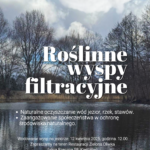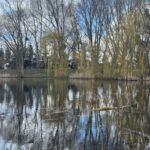Plant Filter Islands – a way to purify water naturally
The first part of the activities in the 2nd Edition of the 'Plant Filter Islands’ project is behind us! In March, environmental education workshops on the sources of pollution of water bodies were held in the schools of the Municipalities of Długołęka. Self-performed experiments and measuring the level of pollution resulting from fertilizers flowing from fields into lakes, rivers and ponds was an introduction to the topic of water protection and water purification methods.
Indeed, natural ways of purifying water through selected plant species placed on filter islands is the subject of the second edition of our project, implemented thanks to the support of the GlobalGiving Organization and cooperation with the 3M company.
With whom, for whom and why are we involved in water conservation?
Adults, young people and children are involved in our project because, as we have already verified, the involvement of different age and environmental groups in project activities fosters social integration, promotes the possibility of large-scale implementation of the prepared filter island solution. It also confirms the equality and effectiveness of grassroots ecological activities of society, important for health and the environment. And awareness in its protection – especially of local water bodies, fields, meadows and forests – among residents of villages and small towns is insufficient, as is confidence in their ability to solve local problems on their own.
Conventional farms and agriculture using artificial fertilizers for crops provide rapid growth and food security, but also have side effects such as soil and water pollution. These substances, which are harmful to the biodiversity of aquatic environments, run off into rivers and water bodies, polluting them and reducing the diversity of fish and other aquatic organisms. Therefore, the task of the project, in addition to the important social aspect, is to test the effectiveness of natural purification of water by plants and to protect reservoirs from pollution from farms and agriculture.
Participants in the project, students and teachers from Elementary Schools in Kiełczów, Brzezia Łąka, Borowa, Wilczyce, Długołęka, and the High School in Długołęka took part in ecological workshops, diagnosed local problems related to the pollution of nearby reservoirs, and in early April will build island platforms and plant plants with filtration properties on them.
Meanwhile, on Saturday, April 12 at 12:00 pm, 'small and big’, residents of villages, cities and towns will meet to 'launch’ islands on the lake and test the effectiveness of natural water purification. H2O SciTech – Water Institute in partnership with the Municipalities of Długołęka and the 'Green Olive’ („Zielona Oliwka”) Restaurant invite you to joint ecological activities to Kiełczów, 58 Rzeczna Street!



